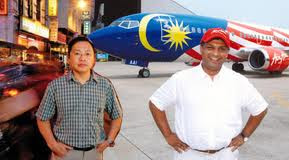WELCOME BACK: Sweden, which closed its embassy here in 2011, is busy playing catch-up
"WE are on track again. It's business as usual," says new Swedish ambassador to Malaysia Bengt Carlsson, who has spent the past five months repairing the damage done by the closure of the mission in 2011.
To be sure, it was a financial problem over budget allocations that spilt over into diplomacy.
But it has been left to diplomats like Carlsson, and the handful of others sent to reopen closed missions, to build relations from scratch.
They also have to convince the host countries and the local Swedish communities that all is well despite having sold the ambassadors' residences and tying up all loose ends before leaving not too long ago.
Despite Carlsson's efforts to downplay the effect of the closure, it must surely have been difficult for the Swedish business community here to liaise with their embassy in Jakarta over urgent matters.
"The damage caused by the closure of the embassy here was limited. We are happy to be back," he tells me as we sit in the small conference room of the mission on the 16th floor of G-Tower in Jalan Tun Razak, Kuala Lumpur.
Malaysian-Swedish Business Association (Masba) president Hans Bjonered, who had lamented two years ago on learning of the closure, must surely be smiling now.
He had said that business would be more difficult to conduct here for Swedish companies without a mission in Kuala Lumpur.
Embassy staff, sharing premises with Business Sweden (formerly the Swedish Trade Council), headed by Carl Malmqvist, can be expected to be looking forward for the move to Hampshire Place nearby on April 1.
The date is no laughing matter, really, for Carlsson who probably may see the physical move as a new beginning in Malaysia to a bilateral relationship going back decades that was temporarily inconvenienced in a moment of bureaucratic madness.
There are many things on his plate that the former deputy head of mission in Thailand needs to attend to, starting with trying to bring in more small Swedish businesses here.
"The big Swedish multinationals like Ikea, Volvo and Eriba know the country well. We are looking more into small businesses now employing between 20 and 40 people," he says, adding that the accent this year would be on, among others, green technology and recycling.
Other areas that he will look into include innovation projects among Malaysians, life sciences and healthcare, traffic safety and academic cooperation between Swedish and Malaysian institutions of higher learning.
Carlsson says Masba, of which he is an honorary council member, will play a crucial role in trying to ensure greater bilateral trade this year.
I ask about defence cooperation and Carlsson is all smiles as he talks about ongoing independent discussions between Saab, Bofors and the Malaysian government on possible purchases.
"This is a very exciting area with a history of the Malaysian navy buying equipment from our side. There is quite a bit of scope in this," he says, adding that Defence Attache Lt-Col Johan Tornqvist is based in Stockholm and visits almost monthly.
Tornqvist cannot be based here for good reason: he is also the aide-de-camp to the King of Sweden, which obviously is a very heavy responsibility.
Moments later, Tornqvist pops in, exchanges business cards, and prepares for the trip back home but not before promising to be back for the Langkawi International Maritime and Aerospace Exhibition (Lima).
At this juncture, Malmqvist comes in to brief me for a few minutes on what Business Sweden is all about in a pre-arranged schedule that smacks of efficient Swedish time management.
He explains that the new entity came into effect on Jan 1 this year with the merging of the Swedish Trade Council and Invest Sweden.
"I am part trade commissioner, too, besides my role as market manager of Malaysia for Business Sweden. I want to attract new Swedish companies to Malaysia," he says, adding that he wants to create a local talent pool for Swedish companies here.
Swedish exports to Malaysia generally consist of telecommunication equipment, motor vehicles, chemical products, power generating machinery and equipment, machines, paper, as well as iron ore and steel.
Swedish imports from Malaysia comprise electronics and electrical components, machinery and apparatus, textiles, palm oil and rubber - New strait Time
.jpg) SIBU: Price of Mandarin oranges from China is higher by more than 10% this year compared to the price last year.
SIBU: Price of Mandarin oranges from China is higher by more than 10% this year compared to the price last year..jpg)
.jpg)
.jpg)

.jpg)
.jpg)

.jpg)
.jpg)
.jpg)
.jpg)